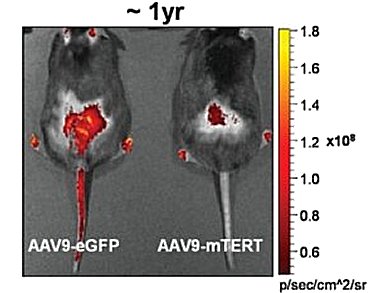Telomeres are the caps of repetitive DNA nucleotide sequences that sit at the ends of chromosomes. They are gradually worn down each time a cell divides. Progressive erosion of telomeres eventually stops cells from dividing and leads to cell death.
Maria A. Blasco, Spanish National Cancer Centre (CNIO), Madrid, and colleagues used an adeno-associated virus vector to introduce the telomerase gene into the cells of adult mice. Telomerase helps restore longer telomeres by adding DNA back to the ends of chromosomes.
In addition to living longer, engineered mice had stronger bones, improved metabolic functions, better motor coordination and balance, as well as improved performance in object-recognition tests.
The mice that were used in the experiments typically live for approximately 150 weeks. One-year-old mice that were treated by gene therapy lived on average 24 % longer; the average lifespan of two-year-old mice increased by 13 %. By using older mice, the scientists were able to take advantage of the rejuvenating effects of the telomerase enzyme without the increased risk of cancer reported in earlier studies with younger animals.
- Telomerase gene therapy in adult and old mice delays ageing and increases longevity without increasing cancer,
Bruno Bernardes de Jesus, Elsa Vera, Kerstin Schneeberger, Agueda M Tejera, Eduard Ayuso, Fatima Bosch, Maria A. Blasco,
EMBO Molec. Med. 2012.
DOI: 10.1002/emmm.201200245EMBO Molecular Medicine, one of the highest cited journals in the biomedical sciences, is now a fully Open Access journal.




